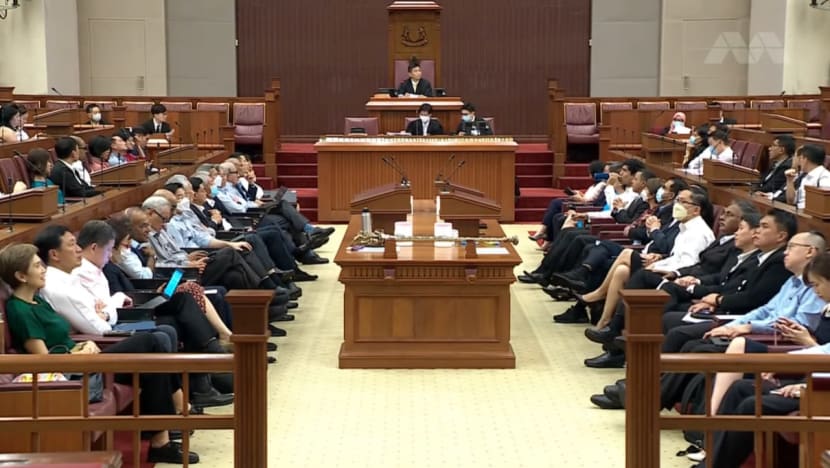Singapore passes laws to decriminalise gay sex, protect definition of marriage against legal challenge
The repeal of Section 377A passes in Parliament with 93 to three votes while a Constitutional amendment goes through with 85 to two.

SINGAPORE: Singapore will decriminalise gay sex and protect the definition of marriage against legal challenge, after Parliament approved changes to two Bills on Tuesday (Nov 29).
A repeal of the colonial-era Section 377A in the Penal Code was passed with a majority of 93 to three votes.
Workers' Party (WP) Members of Parliament (MPs) Dennis Tan (WP-Hougang) and Gerald Giam (WP-Aljunied), as well as Nominated Member of Parliament (NMP) Hoon Hian Teck, had stated in their speeches over a two-day debate that they would not support the repeal.
All People’s Action Party (PAP) MPs present voted for the Bills. The party did not lift its whip, which meant its MPs had to vote according to the party's position.
A constitutional amendment to protect the definition of marriage against legal challenge was passed with a majority of 85 to two votes.
Two MPs - Ms Sylvia Lim (WP-Aljunied) and Ms He Ting Ru (WP-Sengkang) - abstained from the vote.
Non-Constituency MP (NCMP) Hazel Poa had earlier stated that she and her Progress Singapore Party (PSP) NCMP Leong Mun Wai would vote against the proposed amendment, because they believe the definition of marriage should be determined by a national referendum.
CONCERNS OVER TRADITIONAL FAMILY VALUES
During the two-day concurrent debate on both Bills, nearly 40 MPs from both sides of the House rose to speak, with several raising concerns about protecting traditional family structures and values, as well as social policies.
Others stressed the need to prevent discrimination against those who believe in the definition of marriage as union between a man and a woman.
On the other hand, some also urged the Government not to discriminate against those outside the traditional institution of marriage, such as people who are single, divorced or widowed.
In his wrap-up speech on Tuesday, Law and Home Affairs Minister K Shanmugam reiterated that the constitutional change would protect the heterosexual definition of marriage along with laws and policies based on that.
“Just as we have been clear about repealing 377A - we took a clear position - we are equally clear, and this government is very clear, that we will protect the heterosexual marriage as a key institution in our society,” he said.
He also accused the WP of not wanting to take a stand on the matter, and slammed their reasons for lifting the whip as "factually untrue".
“The Workers' Party MPs could have made all the speeches they made, even with the whip in place.” said Mr Shanmugam. “MPs are always entitled to state their honest views, they can agree they can disagree, they can say what they think, you can express your views whatever they are, without having to lift the whip.”
"The whip does not and has not prevented MPs from speaking their minds," he said. "The whip is relevant for voting, not speaking, and the whip sets out the party's position."
In his speech, the minister also noted that there were a “small” number of individuals who were convicted between 1988 and 2007 for consensual and private homosexual acts between adults. He said he had instructed his ministry to consider how their records could be rendered spent or removed.
Mr Shanmugam told the House that there was no plan to let individuals remove their registered sex from their NRIC or passport.
He reiterated that the law ministry was looking at ways to deal with the harm caused by cancel culture, because "people really ought to be free to stand by their beliefs, express their views, with due respect for the feelings of others" without fear.
RIGHT TO RELIGIOUS FREEDOM
Social and Family Development Minister Masagos Zulkifli's round-up speech also addressed MPs' concerns on religious freedom.
He stressed that there were no plans to change the definition of marriage to include same-sex marriages, adding that it would be against the law for religious leaders or any licensed solemniser to solemnise a same-sex couple.
Every person has the right to practise their own religion as religious freedom is also protected in the Constitution, he said.
“One can still preach on the pulpit their beliefs about homosexuality or family, even if others might disagree. But no one should incite violence or hate towards others,” he said.
He added that religious organisations, as owners of their premises at places of worship, have the discretion to refuse same-sex solemnisations or weddings to be held on their premises.
“In exercising religious freedom, we must understand that we are also members of a plural society,” he said. “We must graciously accommodate those who have different values from us. Gay people are members of our society and have access to the same opportunities and social support as other Singaporeans.”
Turning to schools, Mr Masagos said Singapore’s education policies and curriculum remain anchored on prevailing family values and social norms.
These include the family as the cornerstone of the country’s social fabric, and marriage between a man and a woman, he said.
Concluding his speech, Mr Masagos said the debate on the two Bills proved that Parliament was the right forum for issues and policies that were complex and required political judgment.
Parliament was stepping up to do its duty, he said.
“With the passing of two Bills ... We have created space for society to deliberate on social issues within the political process, and not through a legal route which is zero-sum in nature," said Mr Masagos.
“It is a responsible Government that has balanced the views expressed by Members and stakeholders and has shown the viable way forward.
“This is the strength of our system in Singapore when each branch - the legislature, executive and judiciary - does its part to its fullest and does it well, and does what is right for Singapore and Singaporeans."













_1.jpg?itok=Pt4lopXb)




